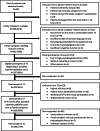Supportive care needs and service use during palliative care in family caregivers of patients with advanced cancer: a prospective longitudinal study
- PMID: 32632761
- PMCID: PMC7843549
- DOI: 10.1007/s00520-020-05565-z
Supportive care needs and service use during palliative care in family caregivers of patients with advanced cancer: a prospective longitudinal study
Abstract
Purpose: This study aimed to investigate the supportive care needs of family caregivers (FCs) of advanced cancer patients and their support service use at the beginning of specialist inpatient palliative care (SIPC), near the patient's death, and during bereavement.
Methods: FCs reported their needs using the Family Inventory of Needs (FIN), along with their utilization of psychosocial and bereavement support services at the beginning (N = 232) and 6-9 months after SIPC (N = 160).
Results: At the beginning of SIPC, mean of 16.9 of 20 needs were reported to be highly important, and 12.2 were reported to be met. At the time of the patient's death, 16.8 needs were highly important, and 13.8 were met. At both time points, the highest ranked need was related to information about changes in the patient's condition (100% vs. 99%), and the most frequently unmet need was related to feeling hope (73% vs. 71%). Multivariate linear regression analysis revealed a low education level to be consistently related to a greater number of highly important needs. Higher satisfaction with care and better social support was related to a greater number of met needs. Twenty-five percent of FCs had accessed at least one psychosocial support service prior to SIPC, and 30% had done so during bereavement. Among non-users of support services, > 75% indicated sufficient informal support as a barrier to service use.
Conclusions: The findings offer a useful guide for adequately addressing FCs' needs in an effort to optimize FC support. However, only a subgroup of the FCs used support services. Better information and provision of tailored services might improve FCs' situations in the future.
Keywords: Cancer; Family caregiver; Needs; Palliative care; Prospective studies; Support services.
Conflict of interest statement
The authors declare that they have no conflict interest.
Ethical committee approval was granted by the ethics committees of the General Medical Council of Hamburg (PV5122) and the University Medical Center Goettingen (1/4/16), Germany. Written informed consent was obtained from all participants included in the study.
Figures
References
-
- Hwang SS, Chang VT, Alejandro Y, Osenenko P, Davis C, Cogswell J, Srinivas S, Kasimis B. Caregiver unmet needs, burden, and satisfaction in symptomatic advanced cancer patients at a veterans affairs (VA) medical center. Palliat Support Care. 2013;1:319–329. doi: 10.1017/S1478951503030475. - DOI - PubMed
MeSH terms
Grants and funding
LinkOut - more resources
Full Text Sources
Medical
Miscellaneous


